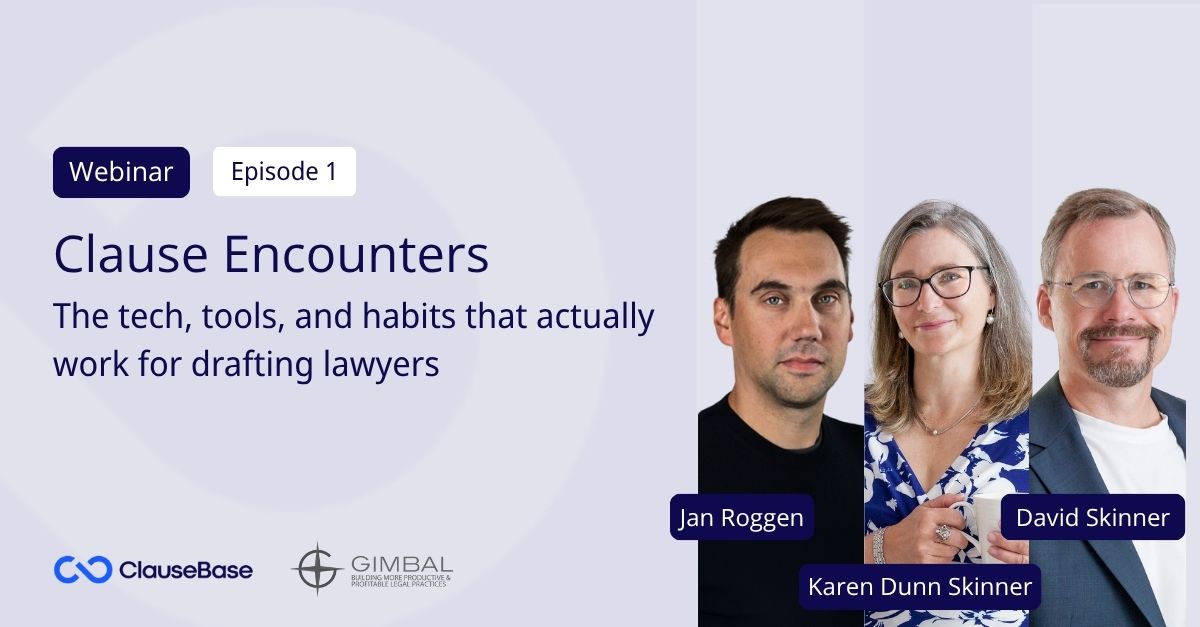The first episode of Clause Encounters kicks off with a familiar struggle for many lawyers: how to spend more time doing the work you actually care about, and less time getting buried in everything else. Host Jan Roggen chats with Karen and David Skinner, the brains behind Gimbal Consulting and authors of The Power Zone Playbook for Lawyers, about how to build a legal practice that’s not just productive and profitable, but genuinely enjoyable.
At the heart of their conversation is the idea of the power zone. It’s where your legal skills, your energy and your impact all line up. When you’re drafting a complex clause or solving a tough legal issue that only you can handle, you’re in it. The goal is to spend more time there, and that means getting better at letting go of everything else.
Let’s take a closer look at what that means in practice, and why these ideas are striking a chord with so many legal professionals.
The power zone: do the work only you can do
The power zone has three ingredients. It’s work you’re uniquely good at, work you enjoy and work that creates real value. Miss one of those? It’s probably not where you should be spending your time.
Karen and David point out that lawyers are often stuck outside their power zone, tangled up in admin or routine tasks that could easily be handed off or automated. The more you clear that stuff away, the more room you make for the kind of work that feels good and moves the needle.
The post-it party: make your time visible
Most of us think we know where our time goes. But until you write it all down, you’re probably guessing. That’s where the post-it party comes in.
Here’s how it works. For a couple of weeks, jot down every single thing you do on a post-it. Yes, even the tiny things. Then stick them up and sort them. What you get is a surprisingly honest picture of your day-to-day.
Chances are, you’ll spot patterns you didn’t expect. Maybe you’re spending an hour a day tweaking document formatting. Or following up on signatures. Once you see it, you can start changing it.
The delegation quadrant: sort it and shift it
So, now you’ve got your post-it wall. What next? Time to sort your tasks into four buckets.
There’s what only you can do. What you can delegate. What a machine could handle. And what doesn’t need to be done at all. Karen and David call this the delegation quadrant, and it’s a simple way to get your workload under control.
A good place to start? The stuff you don’t like doing. It’s usually easier to delegate, and you’ll be a lot happier once it’s off your desk.
Delegation works best with clear instructions
Of course, handing things off is only helpful if people know what “good” looks like. That’s where many lawyers get stuck. If you’ve ever taken a task back because “it’s just quicker to do it myself,” you know the feeling.
Clear processes solve that. Whether it’s a quick checklist, a screen recording or a written walkthrough, documenting how you do something makes it easier for others to follow, and frees you up to focus on bigger things.
The five whys: dig deeper to fix real problems
Ever fix something, only to have the same issue pop up again? You might be treating the symptom, not the cause. That’s why Karen and David suggest using the “five whys” technique.
It’s simple. Ask “why” five times in a row to get to the root of the problem. For example, why was a deadline missed? Because the document was late. Why was it late? Because no one followed up. Keep going, and you’ll often find the real issue has nothing to do with the surface problem.
Change hits close to home
Some of the most interesting parts of the episode go beyond process. Karen and David talk about why change can feel so personal for lawyers. It’s not just about habits, it’s about identity.
For a lot of people, how they work is tied to how they see themselves. So, when you suggest doing things differently, it can feel like a challenge to their role or status. That’s why the human side of change matters so much.
The answer? Help people see that change doesn’t mean giving up who they are. It’s about expanding what they can do.
Start small, explain clearly
The episode wraps up with a reminder not to try and fix everything at once. Look for small wins. Share them. And bring the team along for the ride.
People are much more open to change when they understand the “why”, and when they feel part of the process. That’s also how you avoid the all-too-common trap of throwing software at a problem that’s actually about people or process.
Final thoughts
This first episode of Clause Encounters strikes a great balance between practical advice and bigger-picture thinking. It’s not just about doing more with less. It’s about working in a way that feels better, makes more sense and actually helps lawyers thrive.
If you’re part of a legal team looking to work smarter, start by asking yourself where your power zone is. Then grab a stack of post-its and take an honest look at what’s getting in the way.
You can learn more about Karen and David’s work over at Gimbal Consulting.
Thanks so much for joining us for this first episode of Clause Encounters! If you missed the live session or want to watch it again, you can catch the full webinar here. We’re excited to keep the conversation going in the next episodes, stay tuned!















